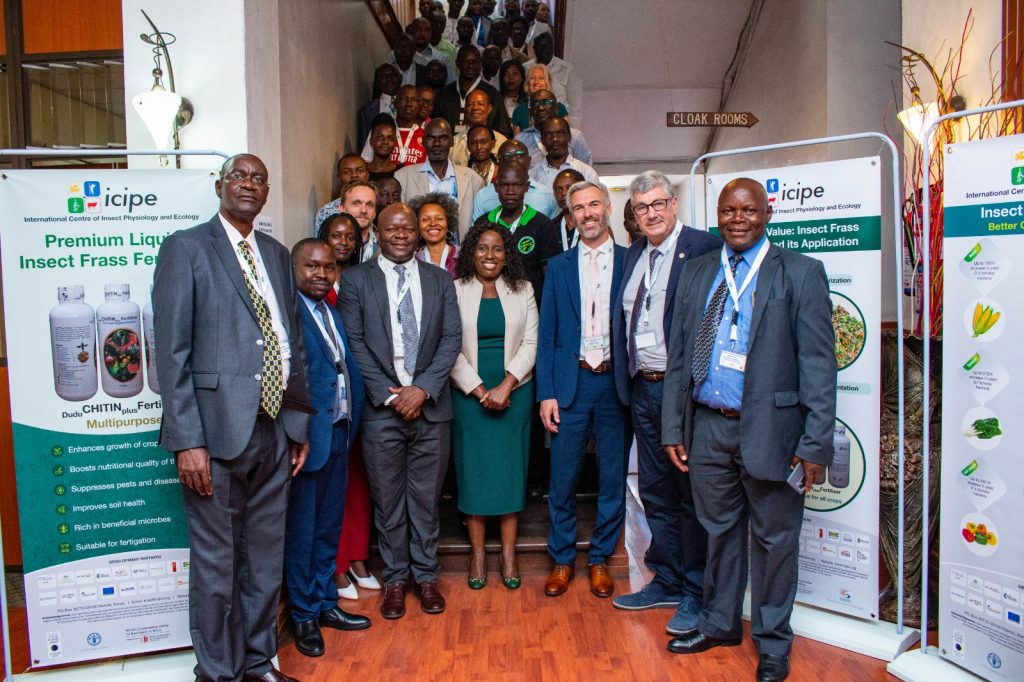
BIO Kenya Research Project Officially Launched: Transforming Agriculture in Kenya with Sustainable Solutions
On September 23rd, 2024, the BIO Kenya Research Project was officially launched in Kisumu, marking a new era in sustainable agriculture for Kenya. Funded by a €1 million grant from the French Embassy in Kenya through the National Research Fund and led by a consortium of top research institutions including KALRO, icipe, the University of Embu, and Koitaleel University College, this two-year project seeks to revolutionize farming practices through the large-scale validation and commercialization of biochar and insect-composted organic fertilizers (ICOF).
Addressing the Urgent Need to Improve Soils
The BIO Kenya initiative responds to the urgent need to improve soils in Kenya, particularly against the backdrop of rising costs of chemical fertilizers and other agricultural inputs that are beyond the reach of many smallholder farmers. Furthermore, chemical fertilizers contribute to soil acidity, greenhouse gas emissions, and increased vulnerability to crop diseases and pests, all of which result in low yields and exacerbate food insecurity in the country.
This challenge is further compounded by the impacts of climate change, making corrective action critical to ensuring food security and sustainable agriculture in Kenya. Locally produced organic fertilizers and soil amendments, such as biochar and insect-composted organic fertilizers, present a natural solution for regenerating soil productivity. However, their widespread adoption has been limited due to issues related to production time, quality, and availability.
Breakthrough in Organic Fertilizers with ICOF
Research by ICIPE – International Centre of Insect Physiology and Ecology has shown that insect-composted organic fertilizers (ICOF) can be produced faster than traditional compost and significantly improve soil fertility. ICOF enhances crop yields, suppresses pests and diseases, and contributes to mitigating climate change through carbon sequestration, all at a minimal cost. These eco-friendly fertilizers offer a viable alternative for smallholder farmers in Busia, Siaya, and Kisumu counties, where the project will be implemented over the next two years.
Building Momentum through Collaboration and Innovation
The BIO Kenya project aims to demonstrate the benefits, feasibility, and profitability of biochar and ICOF through a participatory approach that engages farmers, entrepreneurs, and investors. By involving local communities in the innovation process, the project seeks to refine these solutions and ensure their uptake by key stakeholders.
The direct beneficiaries of this initiative include at least 1,000 farmers—women, men, and youth—along with nine postgraduate students, three governmental organizations, six NGOs, and three entrepreneurs. In total, more than 50,000 people are expected to benefit indirectly from the project’s positive impacts on agricultural productivity, food security, and climate resilience.
Collaborative Partnerships for Impact
The success of the BIO Kenya project hinges on strong partnerships and collaboration across multiple sectors. Key partners in this initiative include the National Research Fund (NRF) Kenya, Kenya Agricultural and Livestock Research Organization (KALRO), University of Embu, Koitaleel Samoei University, ICIPE, IRD Latin Network of Biochar in Cuba, and CIRAD.
A Bright Future for Sustainable Agriculture in Kenya
As we celebrate the launch of the BIO Kenya project, we are optimistic about the future of agriculture in Kenya. By leveraging locally produced biochar and insect-composted fertilizers, we are transforming farming practices and creating opportunities for sustainable economic growth. This project is not only a pathway to improving soil health and crop productivity but also a catalyst for job creation, capacity building, and climate action.
Additional key partners: Include Sida, the Swiss Agency for Development and Cooperation (SDC), the Australian Centre for International Agricultural Research (ACIAR), Norad (Norwegian Agency for Development Cooperation), Deutsche Gesellschaft für Internationale Zusammenarbeit (GIZ), Federal Ministry for Economic Cooperation and Development (BMZ), and The Rockefeller Foundation. The combined efforts of these organizations ensure that the project is not only innovative but also impactful on a large scale.
Stay tuned for more updates as the BIO Kenya Research Project paves the way for a sustainable, resilient, and food-secure future!